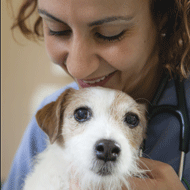So many diets, what's the difference?

Nicola talked about open and closed formula diets, complete diets and complimentary diets.
This was the title of Nicola Ackerman's talk to nurses in the Nutrition Stream at BSAVA Congress.
The ever increasing abundance of diets coming onto the market causes a great dilemma for veterinary nurses when it comes to recommending the right food for their clients pets. How can nurses know about all these foods and which are best were the questions she posed to the audience.
Nicola talked about open and closed formula diets, complete diets and complimentary diets. She explained the term TVP - textured vegetable protein commonly used in wet dog diets and also discussed hyperallergenic diets - those likely to cause fewer allergic reactions than the 'norm'.
She discussed the use of cereals in pet diets explaining that dogs have evolved enough to be able to digest at least some of the starch in cereals and dispelled the notion put forward by some, that dogs should be only fed like their wild ancestors the wolves.
The term 'natural' when applied to pet food is not a regulated term and can actually be used for any diet even though it is sometimes used as a marketing strategy by some companies. Finally there are the 'boutique' foods designed for very specific markets, these niche foods are expensive but are beginning to appear more in the complex world of pet diets.
There is the potential for the veterinary nurse to be asked about the quality and use of all these different diets and Nicola's advice was to consider each pet as an individual case. What works well for one dog may not work so well for another and really before recommending a particular food the nurse needs to know the pet's nutritional history as well as what the pet actually likes eating and the owner's own feelings and opinions on feeding their pet.
She suggested talking to food companies, visiting them and seeing how their food is processed if that is possible and to carry out as much evidence based nutritional research as possible. The Royal College of Veterinary Surgeons Knowledge Seminars provide good information on nutritional research and this together with a nurse's own experiences and nutritional knowledge will go a long way towards helping the busy nurse to provide the right advice for their clients.



 The latest
The latest